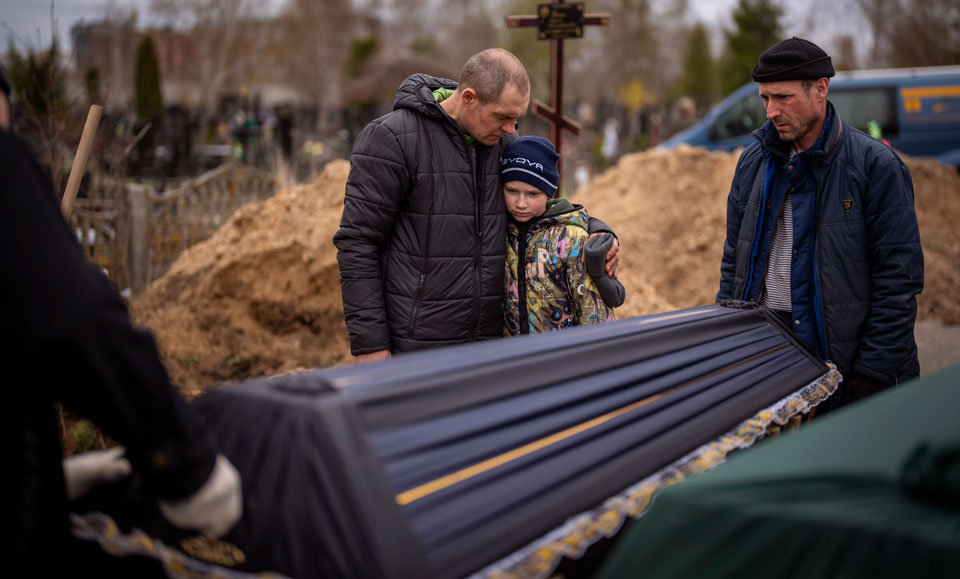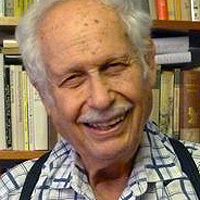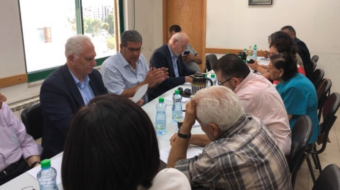
Despite my horror at the death, destruction, and misery I see in the Ukraine footage daily on TV, my entire background demands a careful analysis of this conflagration which may yet fling flames across more borders and can all too easily kindle atomic annihilation. Why did Russia send an army into Ukraine? Was it pure imperialism? A terrible miscalculation? Did its leaders see it as a dire necessity? Or was it a baited trap?
To start with, I cannot forget, deny, or ignore what I have seen happen since 1945—how the Pentagon, White House, Congress, and those behind them sought the defeat of one pro-socialist effort after another. They failed in Cuba and Vietnam, they succeeded in Ghana, Grenada, Chile—and, most important, in Europe. By utilizing every weakness, blunder, even offense, and exerting every form of pressure, Poland was won by a team led by Ronald Reagan, “Polish Pope” John Paul II, the CIA, and a few experts in the AFL-CIO.
In 1989-90 it was the GDR’s (East Germany’s) turn, with help from U.S. Ambassador to Bonn Vernon Walters, a former CIA Deputy Director who had played a major role in Poland. In 1991 came the glorious victory over the USSR, where Boris Yeltsin, an alcoholic marionette, opened the gates to ten years of chaos, desolation, and sell-out to new Russian oligarchs and not-so-new U.S. corporations.
That’s when Vladimir Putin stepped in, using his own set of oligarchs, crossing himself piously as he knelt in church but keeping a tight state hold on banks and basic resources. This was not at all what American businessmen and politicians wanted. So the U.S.-led military pact NATO, breaking its promise of 1990 not to move an inch eastwards, advanced, one regime-changed ally after the other, towards complete encirclement of Russia.
In 1999, Poland, Hungary, the Czech Republic; in 2004, Slovakia, Bulgaria, Romania, Estonia, Latvia, Lithuania; then the hinterland in fragmented, bombed ex-Yugoslavia: Slovenia, Croatia, Montenegro, North Macedonia. Only a few more were needed to close a tight ring around Russia. Afghanistan did not pan out, nor did Georgia (though attempts are vigorously continuing). But most important was Ukraine, which could block Russia from the Black Sea and sat within 400 miles of Moscow.
The elected president of that huge gem, Viktor Yanukovych, unwilling to become part of the encircling noose, sought a more neutral position. “Not enough!” said NATO and sent in Nuland. Victoria Nuland, a deputy in Hillary Clinton’s State Department (and wife of a top Cold War strategist), went to Kiev, dealt out at least $5 billion and even tasty cookies to a largely right-wing, anti-Russian crowd, and maybe a few to the mysterious snipers who forced the president to flee for his life.
In a famous hacked phone call, Nuland personally chose the next Ukrainian ruler, banker-politician Arseniy Yatsenyuk, a man supported by the “Freedom Party” of Oleh Tyahnybok, who had denounced the “Jewish-Russian Mafia” and praised Ukraine’s new hero, Stepan Bandera, who led in murdering thousands of Jews and Poles in 1941.
One of the new rulers’ first measures discriminated against the many Russian speakers, limiting the use of all but Ukrainian, making them second-class citizens. In Crimea, the locals became angry enough to vote, with a big majority, to break with Ukraine and rejoin Russia (to which they had belonged until 1954). In eastern Donbas, they formed two separate republics, much as Albanian-speaking people in Kosovo broke away from Serbia in 2008. In such decisions, national pride, or self-defense, superseded complex international rules. Military operations against Donbas were soon launched by the government in Kiev, using the fascistic “Azov” militia units as shock brigades.
With Ukraine now a new segment in the ring around Russia, NATO built up its strength there, first with “non-lethal” arms and trainers, letting allies like Lithuania pass on the bigger stuff. Then came a series of military maneuvers. The Defender-Europe 20 war games were hindered by COVID-19, but in 2021, the Sea Breeze games were conducted in the Sea of Azov and the Black Sea with more than 30 warships and 40 planes from 32 countries not far from the Russians’ southern naval base of Sevastopol.
Then it was Operation Cossack Mace, with a goal to “improve compatibility between British and Ukrainian military formations, strengthen mutual relations, joint planning, and perform battalion and tactical operations.” Two British-built naval bases were planned near the short Russian coast.
In September 2021, it was Rapid Trident 21. “To increase combat readiness, defense capabilities, and interoperability, the exercise features joint jumps of Ukrainian and U.S. paratroopers,” it was announced, and “for the first time, service members will conduct battalion tactical exercises of a multinational battalion with combat shooting in a single combat order.” The purpose, it said, was “to prepare for joint actions as part of a multinational force during coalition operations.” Joining the U.S. and Ukraine were Bulgaria, Canada, Georgia, Germany, Italy, Jordan, Lithuania, Moldova, Pakistan, Poland, Romania, Turkey, and the U.K.
Such activities were allegedly for peace and to defend Ukraine against “authoritarianism.” But Russia viewed the threat of cutting it off in the Baltic and the Black Sea, plus 700 or 800 big or small U.S. bases on six continents, in a very different way. Washington was a safe 7,800 miles away; St. Petersburg and Moscow were under the noses of those missile launchers, warplanes, and warships, and the U.S. alone had a 13-to-1 preponderance over Russia in military spending. Bipartisan American politicians were outdoing themselves in reviling Russia, nor could the Maidan events with Victoria Nuland be forgotten.
As for Russia’s president, it is hardly surprising that he was alarmed, perhaps even for personal reasons in view of the fates of other leaders disliked by Washington: Allende, dead in his bombed residence; Lumumba, tortured and murdered; Saddam Hussein, hanged; Muammar Gaddafi, fatally sodomized; the Afghani Najibullah, castrated and strung up; Slobodan Milošević, mysteriously dead in a prison cell. (Fidel Castro was luckier, surviving over a hundred bungled CIA assassination attempts.)
In a 14-page historical summary, Putin wrote:
“We respect the Ukrainian language and traditions. We respect Ukrainians’ desire to see their country free, safe, and prosperous.” … “Russia is open to dialogue with Ukraine and ready to discuss the most complex issues. But it is important for us to understand that our Ukrainian partner defend its national interests not by serving someone else’s, that it not be a tool in someone else’s hands to fight against us.”
That was in July 2021. How sincere were such words? What did they mean in February 2022, when Russian troops crossed the Ukrainian border? In 2015, Russia agreed to the Minsk II agreement to avoid further warfare in Donbas and resolve the conflict with negotiations and compromises. Kiev ignored, indeed undermined Minsk II; Germany and France, its co-sponsors, abandoned it.
Russian Foreign Minister Lavrov made proposals to discuss a neutral Ukraine. At first, Zelensky seemed interested, until pressure from Washington and London to “stay tough” prevailed. Lavrov’s further requests to negotiate differences, above all to remove NATO troops and maneuvers from Russian borders, were rejected in December 2021 by Secretary of State Antony Blinken as “very obvious nonstarters.” Was that rejection Russia’s “red line”? Who knows? I only wish they had been “starters” instead—for the White House and Pentagon. That could have saved the Ukrainians immense suffering and exile—although it might have meant fewer billions for Northrup-Grumman or Raytheon.
And on February 24th? Did Russia perhaps march into an elaborate trap, as it had once done in Afghanistan in 1979? Did the country’s leadership think a big impending Ukrainian offensive against the Donbas republics and their Russian-speaking population, where 14,000 had died in ten years of battle, was an immediate danger to Russia? I cannot know.
One commentator, turning to history, recalled the surprise attack on the USSR by the Nazi armies in 1941, resulting in up to 27 million deaths and vast destruction. He surmised that the Russian leadership, seeing a growing, hostile Ukrainian army, with NATO (or U.S. leaders) guiding it from the wings, decided that a first attack was necessary to prevent any repetition of 1941.
Putin defended the invasion of Ukraine with the following words:
“Today we are told that we started a war in Donbas, in Ukraine. No, it was unleashed by this same collective West which organized and supported the unconstitutional armed coup d’état in Ukraine in 2014, then encouraged and justified genocide against the people of Donbas…
“The West is fighting Russia with all the tools that are also used in a war: weapons, sanctions, money, media, diplomacy. The only thing that slows the West down from intervening with its own soldiers is the danger of nuclear war.
“Ukraine is only the unfortunate sacrificial pawn of the West, which had been prepared for this role since 2014 and with which the West has provoked Russia (with the Maidan coup in 2014, arms deliveries, construction of NATO bases, etc.) until Russia saw no choice but to take military action to protect its own security interests. At the beginning of February 2022, the West rejected the security guarantees proposed by Russia in December 2021 and even refused to talk about them.”
That is the Russian leader’s stated position. True or not, and for whatever reason, the invasion was a tragic choice. Aside from the misery in Ukraine, it has led to a dangerously explosive polarization and painfully split the world’s weak left-wing forces for peace and progress.
The ultimate outcome of that fateful decision remains to be seen.
News-analytical and op-ed articles published by People’s World reflect the opinions of their authors and not necessarily those of the editorial board.












Comments